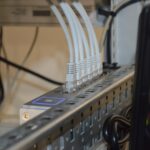The home network is the backbone of the home security system. It is responsible for keeping the family safe and secure from potential threats. However, hackers are constantly looking for ways to exploit weaknesses in home net systems. Did you know that nearly 50% of all cyber attacks are aimed at residential targets? This means that your home network could be hacked without you even knowing it.
If you think your home network has been hacked, there are some important steps you need to take to protect your family and your home. Click here to learn more on how to protect your home network.
- Change all of your passwords immediately. This includes passwords for your router, email, social media accounts, and any other online accounts you have.
- Contact your Internet service provider and let them know that your home network has been hacked. They may be able to offer assistance and help you secure your network.
- Run a virus scan on all of your devices. This includes your computer, laptop, smartphone, and tablet. Be sure to use a reputable antivirus program.
- Keep your software up to date. This includes your operating system, web browser, and any other programs you have installed on your devices. Outdated software can often be the weak link that hackers exploit.
- Enable two-factor authentication on all of your online accounts. This adds an extra layer of security by requiring you to enter a code from your smartphone in addition to your password.
- Be careful what you click on and download. Hackers often use phishing scams to trick people into downloading malware onto their devices. Only download files and click on links from trusted sources.
- Back up your data. In the event that your devices are infected with malware, you can restore your files from a backup. Be sure to store your backups in a safe, off-site location.
- Invest in a good home security system. This can help deter hackers and alert you if someone does manage to break into your home network.
By following these steps, you can help protect your family and your home from the threat of hackers.
10 Things you should never do if your home network is hacked:
- Don’t panic – it can be tempting to freak out if you think your home network has been hacked but try to remain calm. This will help you think more clearly and take the necessary steps to protect your family and your home.
- Don’t ignore the problem – if you think your home network has been hacked, it’s important to take action immediately. The longer you wait, the more at risk you and your family will be.
- Don’t try to fix the problem yourself – unless you are a experienced in cybersecurity, it’s best to leave the fixing of the problem to the professionals. Trying to fix it yourself could make the situation worse.
- Don’t forget to change your passwords – this is one of the most important steps you need to take if your home network has been hacked. Be sure to choose strong and unique passwords for all of your online accounts.
- Don’t neglect to update your software – outdated software can often be the weak link that hackers exploit. Keep all of your programs up to date to help protect your devices from being hacked.
- Don’t forget about two-factor authentication – this added security measure can help protect your accounts even if your passwords are compromised.
- Don’t click on unknown links or download suspicious files – hackers often use phishing scams to trick people into downloading malware. Only click on links and download files from trusted sources.
- Don’t forget to back up your data – in the event that your devices are infected with malware, you can restore your files from a backup. Store your backups in a safe and secure location.
- Don’t neglect your home security – a good security system can help deter hackers and alert you if someone does manage to break into your home network.
- Don’t forget to contact the authorities – if you think you’ve been the victim of a cybercrime, be sure to contact the police. They can help you investigate and prosecute the criminals responsible.
We hope you never have to experience the nightmare of having your home network hacked. But if it does happen, following these steps can help you minimize the damage and protect your family.







